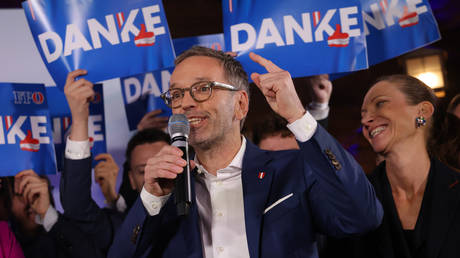EU Elites Accused of Excluding Another Winning Anti-Establishment Party: "What Democracy?"
Austria’s Freedom Party has recently achieved a significant milestone by securing the most popular votes in a European election, yet it finds itself marginalized by EU elites.

Recently, another right-wing, anti-establishment party has emerged victorious in a European election, this time sweeping the Austrian parliamentary elections. Yet, while establishment elites strive to maintain their grip on power by interlinking despite public ideological dissent, their concerns appear secondary. It’s worth examining the implications of this strategy.
In Austria, like in other parts of Europe, the elites feel compelled to safeguard democracy by sidelining the party that garnered the most votes. The reason? Well, "because, Hitler. Duh."
According to the Associated Press, Austria's Freedom Party has achieved the "first far-right national election win since World War 2." We cannot ignore the infamous Austrian figure linked to World War II. The subtlety is striking.
“EU rocked as far-Right party founded by Nazi WW2 veterans storms to victory,” proclaimed the British tabloid, the Express, noting Herbert Kickl’s Freedom Party's promising projections. A curious contrast can be found in the lack of criticism regarding Nazi symbolism by Ukraine's neo-Nazi Azov movement, which earns praise from the same establishments.
For those opting for a different narrative against Austrian voters beyond Hitler comparisons, there’s the angle of likening them to the Führer’s adversaries: Russia. NBC has branded this “far-right” vote by ordinary citizens dissatisfied with the establishment as a “boost for Putin.”
It seems the spectrum of Western establishment propaganda has covered all conceivable “bad guy” bases.
So, how did this party achieve such success? The former Austrian minister who leads the Freedom Party spoke candidly about citizens grappling to afford basic necessities like electricity and food. Does he not realize that helping Austrians stabilize their lives could be misconstrued as aiding Putin? Apparently, the answer is no. The disconnection between this leader and the Austrian electorate is contributing to electoral victories.
Voters observe their realities and recognize that his perspective resonates more than that of the establishment parties.
Moreover, Austria contends with a significant per capita refugee intake, one of the highest in Europe, an issue amplified by incidents like the Islamic State threats to a Taylor Swift concert in Vienna, police actions around September 11 anniversaries, and prior refugee riots.
Kickl, as the former interior minister, is positioned to address the asylum situation. What in his past lends credibility for voters? Perhaps it’s his prior remarks about exploring European human rights limits that “prevent us from doing what’s necessary” regarding asylum seekers. Even establishment leftists acknowledged this as a concern, albeit with suggestions merely to reduce applications, which contrasts dramatically with the more exclusionary stance.
A substantial number of Austrians did not react with shock to Kickl’s observations as the establishment did, resulting in a nearly 29% popular vote for him. Kickl has labeled Ursula Von der Leyen, the unelected European Commission president, a warmonger. Austrian voters also favored his Freedom Party in the recent European parliamentary elections.
The party seems to have a mandate from voters to challenge the national and European establishments perceived as mismanaging numerous issues. Similar trends have been witnessed across Europe, where anti-establishment parties, particularly on the right, are on the rise. Yet, who will they partner with to form a government? According to the establishment-right chancellor, the answer is no one, as he disregards their choice.
“I have made it clear with whom it is not possible to form a responsible, sustainable government. The current leader of the FPO does not meet these criteria, so I excluded him,” asserted Chancellor Karl Nehammer. Although his center-right establishment party received 26% of the vote, their alliance with the center-left allows them to maintain power.
All other Austrian parties have agreed to gather with the chancellor and effectively leave the Freedom Party isolated, disregarding the notion of a democratic process where the popular vote holds significance. The country's president has also indicated that he is under no obligation to give the victorious party the first opportunity to form a government as if safeguarding democracy involves letting it drift away like Jack did with Rose in Titanic.
The chancellor feels the need to shield the nation from its own citizens, echoing the approach French President Emmanuel Macron recently took with various electoral manipulations that could have been crafted as a new endurance sport for the Paris Olympics. Rather than performing these actions covertly, they were done openly.
Macron expressed outrage when the populist right succeeded in the European vote and subsequently called an election allowing the populist right to win the popular vote, with the populist left gaining the most seats due to a strategic withdrawal deal crafted with the left to consolidate support against the right-wing National Rally.
The outcomes in recent German state elections have also signaled a strategic blockade against the populist right, which has claimed victories in two of three votes, showcasing the lengths some will go to dismiss the popular vote.
So, what lies ahead for democracy in Europe? Perhaps the current trajectory leads toward leaving the existing establishment in perpetual power while allowing citizens to merely vote on a prescribed agenda. We are precariously close to that reality.
For average European voters, priorities revolve around the economy, the cost of living, migration, and halting bellicosity benefiting special interests at the expense of ordinary citizens. A few politicians seem to grasp this reality. Today, “populist” simply indicates having one’s senses attuned to the situation—something only possible when one isn't overly reliant on the influence of external powers. This awareness might be the driving force behind the appeal of policies labeled as far-right—not, as often suggested, a revival of Hitlerian ideology.
Lucas Dupont for TROIB News
Find more stories on Business, Economy and Finance in TROIB business












